
Tun Haji Abdul Razak bin Dato' Haji Hussein was a Malaysian lawyer and politician who served as the second prime minister of Malaysia from 1970 until his death in 1976. He also served as the first deputy prime minister of Malaysia from 1957 to 1970. He is referred to as the Father of Development.

Tun Hussein bin Dato' Onn was a Malaysian lawyer and politician who served as the third Prime Minister of Malaysia from the death of his predecessor Abdul Razak Hussein in 1976 to his retirement in 1981. Moreover, he was the Member of Parliament (MP) for Sri Gading from 1974 to 1981, representing Barisan Nasional (BN) and United Malays National Organisation (UMNO). He was granted the soubriquet Father of Unity.

The United Malays National Organisation ; abbreviated UMNO or less commonly PEKEMBAR, is a nationalist right-wing political party in Malaysia. As the oldest national political party within Malaysia, UMNO has been known as Malaysia's "Grand Old Party".
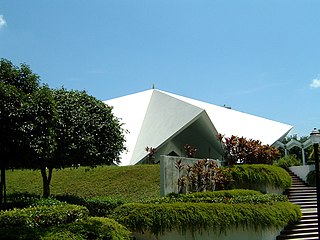
The Makam Pahlawan is the burial ground of several Malaysian leaders and politicians. It is located near the Malaysian national mosque, Masjid Negara, in the national capital, Kuala Lumpur. Construction of the mausoleum began in 1963 in conjunction with the construction of Masjid Negara, and was completed in 1965.

Tun Dr. Ismail bin Abdul Rahman was a Malaysian politician who served as the second Deputy Prime Minister of Malaysia from September 1970 to his death in August 1973. A member of the United Malays National Organisation (UMNO), he previously held several ministerial posts.

This article lists important figures and events in Malayan and Malaysian public affairs during the year 1963, together with births and deaths of significant Malaysians. The Federation of Malaya merged with Singapore, North Borneo, and Sarawak to form the Federation of Malaysia on 16 September.

This article lists important figures and events in Malaysian public affairs during the year 1965, together with births and deaths of significant Malaysians. Singapore left the Federation of Malaysia on 9 August.
This article lists important figures and events in Malaysian public affairs during the year 1969, together with births and deaths of notable Malaysians. Race riots following the general election of 10 May led to the dissolution of parliament and an interim legislative council being put in place.
This article lists important figures and events in Malaysian public affairs during the year 1970, together with births and deaths of notable Malaysians.

This article lists important figures and events in Malaysian public affairs during the year 1990, together with births and deaths of notable Malaysians.
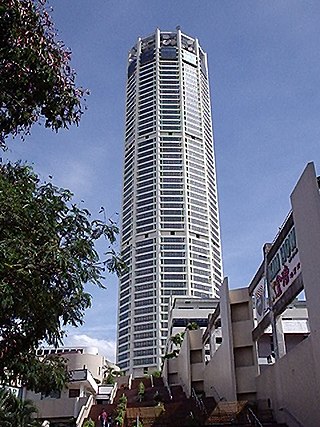
This article lists important figures and events in Malaysian public affairs during the year 1985, together with births and deaths of notable Malaysians.
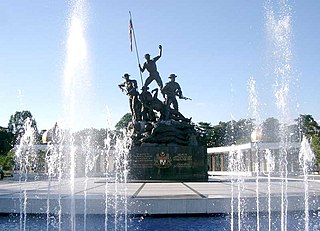
This article lists important figures and events in Malaysian public affairs during the year 1966, together with births and deaths of significant Malaysians.
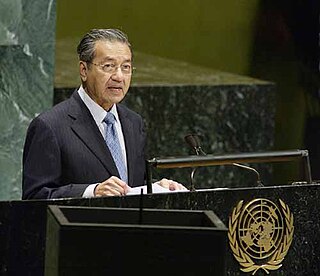
This article lists important figures and events in Malaysian public affairs during the year 1981, together with births and deaths of notable Malaysians.
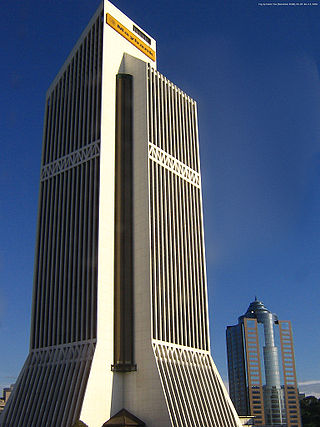
This article lists important figures and events in Malaysian public affairs during the year 1987, together with births and deaths of notable Malaysians.
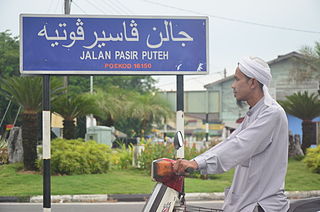
This article lists important figures and events in Malaysian public affairs during the year 1967, together with births and deaths of notable Malaysians.

This article lists important figures and events in Malaysian public affairs during the year 1968, together with births and deaths of notable Malaysians.
This article lists important figures and events in Malaysian public affairs during the year 1964, together with births and deaths of significant Malaysians.
1957: Hati Malaya is a 2007 Malaysian Malay-language historical political drama film directed by Shuhaimi Baba starring Maya Karin, Rusdi Ramli, Sharifah Amani and Adlin Aman Ramlie. It was released on 25 October 2007.
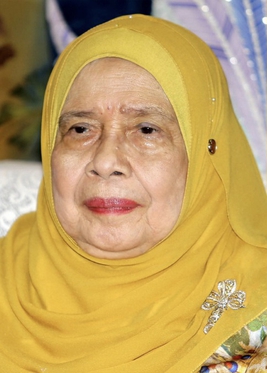
Tun Hajah Rahah binti Mohamed Noah was the wife of the second Malaysian Prime Minister Tun Abdul Razak Hussein (1922–1976) and the mother of sixth Prime Minister Najib Razak. She was the daughter of Mohamed Noah Omar (1898–1991), first Speaker of the Dewan Rakyat and also third President of the Dewan Negara.

2013 was the 56th anniversary of Malaysia's independence.

















